
 I always, always enjoy myself when participating in one of Carl's challenges. I loved the Sci-Fi Experience challenge. Everyone's reviews can be found here. My favorites this time around include Foundation and Empire by Isaac Asimov and The Accidental Time Machine by Joe Haldeman. I chose those two as favorites because they were both by new-to-me authors. The Dead and The Gone by Susan Beth Pfeffer was an excellent book, but I expected it to be wonderful! Susan Beth Pfeffer is a must-read! If anybody is interested in reading Life As We Knew It, I would encourage you to participate in my online reading group. There is a poll going on now to determine if it will be an April or May selection.
I always, always enjoy myself when participating in one of Carl's challenges. I loved the Sci-Fi Experience challenge. Everyone's reviews can be found here. My favorites this time around include Foundation and Empire by Isaac Asimov and The Accidental Time Machine by Joe Haldeman. I chose those two as favorites because they were both by new-to-me authors. The Dead and The Gone by Susan Beth Pfeffer was an excellent book, but I expected it to be wonderful! Susan Beth Pfeffer is a must-read! If anybody is interested in reading Life As We Knew It, I would encourage you to participate in my online reading group. There is a poll going on now to determine if it will be an April or May selection.
Isaac Asimov:
Prelude to Foundation
Foundation
Foundation and Empire
Second Foundation
Foundation's Edge
Foundation and Earth
Joe Haldeman:
The Accidental Time Machine
Old Twentieth
Susan Beth Pfeffer
The Dead and Gone
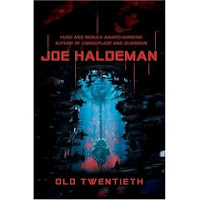
 Haldeman, Joe. 2005. Old Twentieth.
Haldeman, Joe. 2005. Old Twentieth.
This is my second Haldeman novel. My first was The Accidental Time Machine. I loved The Accidental Time Machine. Loved it. My expectations were high, and I was not disappointed. Depending on your expectations, you may love or hate Old Twentieth. Like so many great science fiction stories (dystopian ones especially), it is not so concerned with having that happily-ever-after ending. [The Amazon reviews seemed to be mixed. Some "getting" it, some not. But such is the case I suppose.]
I haven't read much science fiction excluding Orson Scott Card and H.G. Wells. (Unless you count the Star Wars novels. I've read about six or seven of those. I've also read some Isaac Asimov. But his body of work is so extensive, that my few books seem to be a minuscule representation.) My love for the genre stems more from loving Star Trek TNG, Stargate SG-1, and The Twilight Zone. So I don't have that much to compare it with--the plot, the characters, the setting. But in my opinion, Old Twentieth was great. Great in a completely different way than The Accidental Time Machine.
There have been many many books--science fiction books--about the collapse of humanity and society. Books where technological advancements lead men into making foolish choices, lead men into taking the wrong path. (You can also replace the word books with movies and tv shows.) Old Twentieth is just one of many I suppose. Another familiar theme? Humans finding a way to defeat death. Finding a way to become immortal. Finding a way to live forever. Again, such is the case with Old Twentieth. This immortality comes via a drug called BCP. But this drug was expensive. It led to a war between the haves and the have nots. This war was dirty, vicious, ugly. "Lot 92 was a biological agent that killed 7 billion people in a month leaving the world safe for 200 million immortals." But the war had unexpected consequences--the downfall of society. If all of the workers, all the working class, all the ones with little money and little respect and little appreciation--were wiped out it leaves the lazy upper class that are lacking in skills to do the menial tasks that society needs to survive. Usher in more death, more violence, more despair.
Fortunately, Old Twentieth doesn't focus on that past. No, these are distant memories now. The narrative follows the lives of those individuals who have chosen to leave Earth in search of another home, a home on a newly discovered planet that seemingly appears to be compatible for hosting human life. It will take a thousand years and five space ships for these brave (some would say crazy) individuals to arrive. Perhaps longer to set up a colony. (Yes, there are plenty of science fiction novels about humans establishing colonies on other planets.) But first they have to get there. Something that seemed so simple--immortal humans traveling for a thousand years--became a bit more complex along the way.
What do humans do to pass the time? What could you possibly do in relatively cramped quarters for that many years? Sure you could probably entertain yourself a year or two by reading, painting, dancing, playing the guitar, etc. But a thousand years? The ships' entertainment comes from a virtual reality machine nicknamed "The Time Machine." The machine takes humans--five at a time--to various destinations. Each year of the twentieth century, for example, is a separate destination. Humans can experience twenty hours at a time what life was like--using all five senses--in the past. The twentieth century is the playground, the virtual playground, of these passengers.
Our main hero, our narrator, is Jacob Brewer. The time machine is his job--maintaining and overseeing its functionality its use. He has many assistants that help him out as well. A group of five or six individuals who are "experts" in playing this virtual reality game and fixing any technological hiccups when they occur. And they do begin to occur more frequently throughout the novel.
I'm not going to say too much more. If I do, it might color your expectations one way or the other. I certainly approached it like it would be an episode of Star Trek where the holodeck would malfunction. And on the surface, it's a fair comparison. But it is so much more than that. It borders closer to the Twilight Zone and The Matrix. I picked up the Twilight Zone vibes fairly early. And since I love The Twilight Zone, it was a pleasurable experience. I didn't pick up the Matrix vibes until after I finished it. (Then again, I've only watched that trilogy once. And it's not something I think about often. I honestly can't remember what happens in the third movie at the end.)
This is a novel that is in a way deliciously creepy and freaky. It's world is one that is nice to visit for the duration of the book, but that you'd never want to live in yourself!
First sentence of prologue: The smell of death is always with you, like a rotten oily stain in the back of your mouth. Rum won't burn it out and a cheap cigar won't cover it. An unwelcome condiment with every mouthful of rations.
First sentence of chapter one: My family has a tradition, going back to the nineteenth century, that whenever a child was born (only a male child, originally), the father would buy a case of promising wine of that year's vintage.
Joe Haldeman's official site. (His bibliography--which is looking like it might just as well be titled Becky's TBR pile--can be found here.)
272 pages.
S
P
O
I
L
E
R
****Avoid reading if you're even remotely interested in reading the novel*******
This is one of those stories that explore the philosophical aspect of life, of living, of existence, questioning what it means to be "alive" to "exist." One of those stories that border between merely strange dream and full-out nightmare. One of those that ask how do you know you're really awake and not dreaming. One of those that has characters questioning their reality, their very existence.
Here are some SG-1 episodes that it vaguely reminds me of:
[Tin Man, The Gamekeeper, Forever In A Day, The Changeling, Avatar]
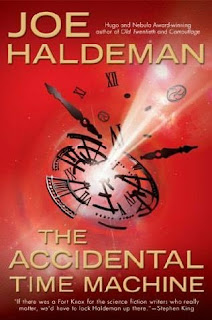
 Haldeman, Joe. 2007. The Accidental Time Machine.
Haldeman, Joe. 2007. The Accidental Time Machine.
The first sentence: The story would have been a lot different if Matt's supervisor had been watching him when the machine first went away.
The last sentence: In 2072, Jonathan Marsh would be given the Nobel Prize in physics, for discovering a curious kind of time travel.
Our hero, our narrator, is a twenty-something MIT grad student named Matt Fuller. He loves working in the labs. And he's putting off writing his dissertation. You might think he sounds pretty typical for a science geek. (He's also recently been dumped by his girlfriend.) But his life is about to take a different turn. And it all starts when his calibrator disappears. It reappears in a flash. It was just a flicker, one brief instant in time--a true if I'd a blinked I'd a missed moment--but it was long enough that it changed a young man's life forever.
The reset button.
All of the drama, the action, centers around this one tiny button on a machine that is about the size of a shoe box. You might not expect something so tiny to have the ability to change the world in the blink of an eye. But it can and does.
I am NOT going to tell you anything about this one. I want to. I really really do. But I can't, I won't. It wouldn't be fair. No matter what I say from this point, it couldn't do justice to the book.
It is exciting. It is fast-paced. It is funny in moments. The writing is definitely all witty and clever and oh-so-right. But it has its serious moments as well. It's very dramatic. (I don't want anyone to think that this is like the sarcastic and silly Hitchhiker's Guide to the Galaxy or anything. The humor isn't like that.) The characters are well developed. Everything about this one is just right. A true must-read in my opinion. It had me almost at hello. (The premise definitely had me at hello.) This is one that I definitely definitely would want to reread at some point. If I'm honest, I'll admit that I want to reread it right now before it's due back at the library. I don't know if I'll give in...but the urge, the temptation is there.
Read This Book. If you've read The Time Machine by H.G. Wells, you need to read The Accidental Time Machine. And if you haven't read The Time Machine, then squeeze that one in as well at some point. Both are fabulous.
Part of me would LOVE to see this on film. I think it could potentially make a great movie. I could almost visualize it. I think it's a nice blend of science fiction and dystopia and just a teeny tiny bit of romance. But the other part of me would hate to see a great great book become a mediocre, laughable film.
278 pages.
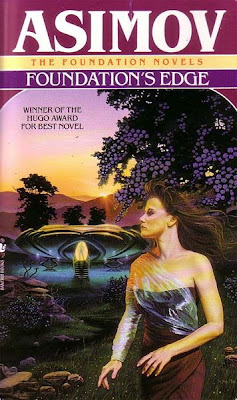
 Foundation's Edge
Foundation's Edge![]() by Isaac Asimov was originally the fourth in the Foundation series. The third novel, Second Foundation, was published in 1953. (The two stories that the novel consists of were published in 1948 and 1949.) Foundation's Edge was published in 1982. Unlike the previous Foundation novels, the remaining books in the series--Foundation's Edge, Foundation and Earth, Prelude to Foundation, Forward the Foundation--were written AS novels. Does it make a difference? You bet! A great BIG difference as far as I'm concerned. Why? The novels seem sloppier, wordier, and sleep-inducing. Okay, maybe they won't really PUT you right to sleep. But in a word. Boring. No pizazz. No magic. Few WOW moments. And a whole lot of asides and tangents. Unless sociology, philosophy, science--all hypothetical studies of the three of course--lessons fascinate you and keep you turning pages, you'll find these novels lack the concise power of the original trilogy.
by Isaac Asimov was originally the fourth in the Foundation series. The third novel, Second Foundation, was published in 1953. (The two stories that the novel consists of were published in 1948 and 1949.) Foundation's Edge was published in 1982. Unlike the previous Foundation novels, the remaining books in the series--Foundation's Edge, Foundation and Earth, Prelude to Foundation, Forward the Foundation--were written AS novels. Does it make a difference? You bet! A great BIG difference as far as I'm concerned. Why? The novels seem sloppier, wordier, and sleep-inducing. Okay, maybe they won't really PUT you right to sleep. But in a word. Boring. No pizazz. No magic. Few WOW moments. And a whole lot of asides and tangents. Unless sociology, philosophy, science--all hypothetical studies of the three of course--lessons fascinate you and keep you turning pages, you'll find these novels lack the concise power of the original trilogy.
Foundation's Edge is the story of two men really. Golan Trevize and Janov Pelorat. Golan Trevize is a Councilman on Terminus. Janov Pelorat is a historian, a scholar, on Terminus. Trevize is exiled by the Mayor because he voiced doubts about the Seldon Plan. He voiced doubts about psychohistory. He voiced concern that the Second Foundation was still out there and still out to get them. Janov Pelorat is forced into exile as well. Not because he did anything wrong, but because Trevize is thought to need a companion, an excuse, a reason to make the journey. Pelorat's hopes and dreams revolve for a time around finding the OLDEST planet, the planet of origin, the place thought of as Earth. Trevize isn't concerned about Earth. He wants to try to find the Second Foundation--if it exists at all--and wants to destroy it. But the two are forced to live together, work together, travel together. They spend most of this book, and most of the next, together on a small spaceship. (A spaceship for 4.)
These characters aren't the only ones doing the narrating, however. There are plenty of minor roles. Plenty of plot twists. Some members of the Second Foundation contribute a large part to the story. But the heart of this one is the ongoing quest by Pelorat and Trevize. Trevize for one reason or another goes along with this search for Earth, and their search leads them somewhat indirectly to the planet Gaia. Oh how tired I am of hearing about Gaia.
Gaia is perhaps a nicer concept of the Borg. It is a planet of "we" and not "I." The air, the soil, the plants, the animals, the humans, the excrements, the food, the walls, the beds, the clothes, everything IS Gaia. Bliss, the woman they meet, is Gaia. She is a part of the planet. Everything she sees, everything she hears, everything she knows, is part of Gaia. There is just one collective memory, one collective consciousness.
Gaia--Bliss--has been drawing--manipulating--Trevize and Pelorat to the planet. And they're not the only ones. Gaia wants to have a big SHOWDOWN with the Second Foundation, the First Foundation, and Gaia. They want Trevize to decide the fate of the universe. Which of the three--Foundation, Second Foundation, Gaia--he wants to see rule the universe for the rest of eternity. Talk about pressure.
S
P
O
I
L
E
R
For some reason or other--he chooses Gaia's concept of Galaxia. A concept that will turn the entire universe--the entire galaxy--into a super-organism. Every part of the universe--the planet, the air, the humans, the animals, the bacteria, the plants, the curtains, etc. into one collective consciousness. It is the loss of individualism. Every person, every animal, every insect, every blade of grass, every amoeba will be Galaxia. He's told that it will be a time-consuming process that will take several hundred years--probably five or six hundred years. So he chooses it with the thought that he can always unchoose it. But is that really true?
 Foundation and Earth
Foundation and Earth![]() picks up right where Foundation's Edge ended. Essentially. But there is some inconsistency between Foundation's Edge and Second Foundation. I don't know how many readers notice this or how many readers care. I don't know if Asimov did this intentionally. But early in Foundation's Edge, one of the main characters, Janov Pelorat, is forced by the Mayor of Terminus into exile alongside Golan Trevize. They make a point of mentioning that Pelorat is leaving behind his wife. Not only is she just his wife--she's his pregnant wife. They refer to her only a handful of times, but apparently, by the end of the novel Pelorat has completely forgotten about his wife. Completely. Forgotten he was married. Forgotten that he was going to be a father. In the last chapter or so, he takes up with a new woman of sorts, Bliss, and for the rest of Foundation's Edge and all of Foundation and Earth not another word is spoken about Pelorat's poor, pregnant, abandoned wife back on Terminus. I believe at one point Bliss even asks if Pelorat is married and he says that he hasn't been married for years. A blatant lie on his part OR a forgetful Asimov at work.
picks up right where Foundation's Edge ended. Essentially. But there is some inconsistency between Foundation's Edge and Second Foundation. I don't know how many readers notice this or how many readers care. I don't know if Asimov did this intentionally. But early in Foundation's Edge, one of the main characters, Janov Pelorat, is forced by the Mayor of Terminus into exile alongside Golan Trevize. They make a point of mentioning that Pelorat is leaving behind his wife. Not only is she just his wife--she's his pregnant wife. They refer to her only a handful of times, but apparently, by the end of the novel Pelorat has completely forgotten about his wife. Completely. Forgotten he was married. Forgotten that he was going to be a father. In the last chapter or so, he takes up with a new woman of sorts, Bliss, and for the rest of Foundation's Edge and all of Foundation and Earth not another word is spoken about Pelorat's poor, pregnant, abandoned wife back on Terminus. I believe at one point Bliss even asks if Pelorat is married and he says that he hasn't been married for years. A blatant lie on his part OR a forgetful Asimov at work.
Foundation and Earth is the story of Pelorat, Bliss, and Trevize. These three are out exploring the galaxy doing everything in their power to find Earth. Trevize is convinced that Earth holds all the answers, all the secrets of the universe. It's a quest he's willing to risk his life--and the lives of his friends--time after time after time. They visit a handful of planets. Each one scarier--either physically or psychologically--than the one that came before. Some are truly horrifying places. And of course at the MOST horrifying one of all they pick up a passenger. Travize doesn't want to. He fights it then and almost every chapter after that. But it does no good. No one will listen to him. The passenger is a young child. A child that they were told would be killed. But by saving this child, did they doom the universe?
I'm not going to have any more spoilers. These four and their quest to find Earth....and what they found and what they did....well, you'll just have to read for yourself.
These two had their brief moments of glory where the writing was good and the plot twists intriguing. However, for the most part, they lacked a lot in storytelling power. I think Asimov's problem with these novels is that sometime between 1953 and 1982, he decided, he determined that the world of Foundation had to be combined with the world he created in his Robot series. I haven't read the Robot series myself. But if these latter novels are any indication, I don't know that I want too. Perhaps, the earlier Robot novels are good. Perhaps not. Maybe fans of the Robot series were let down by these latter books too. Maybe they wish Foundation and Robots had not been combined. Who knows. I only know that Foundation's Edge and Foundation and Earth had way too many awkward conversations about humans and robots having sexual relationships.
Here is how the series is supposedly supposed to go these days.
The Complete Robot (collection of short stories)
The Caves of Steel (1954)
The Naked Sun (1957)
The Robots of Dawn (1983)
Robots and Empire (1985)
The Stars, Like Dust (1951)
The Currents of Space (1952)
Pebble in the Sky (1950)
Prelude to Foundation (1988)
Forward the Foundation (1993)
Foundation (1951)
Foundation and Empire (1952)
Second Foundation (1953)
Foundation's Edge (1982)
Foundation and Earth (1986)
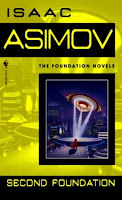
So I finished the third book in the original Foundation trilogy. (The other two being Foundation and Foundation and Empire.) Of the three, I must admit a strong preference for the middle novel. There is something magical that just works about Foundation and Empire. But that's not to say that Foundation and Second Foundation weren't enjoyable enough reads.
What can I say about Second Foundation? Well, it was originally published in novel form in 1953. It had previously been published as two separate short stories in 1948 and 1949. If memory serves me, around four hundred years have elapsed since the opening of Foundation. (It *might* be three hundred or five hundred. But my gut is saying four.) The stories share a theme--a strong theme. While all of the novels--the stories--have shared the theme of preservation and ambition, Second Foundation expands on that theme. This novel is all about the quest.
In the first story, those doing the questing are The Mule and the Mule's men. Han Pritcher, a character first introduced in Foundation and Empire, is one of the main characters. Bail Channis is a new character. He plays a rather large role in the story. These two have been paired together by The Mule to go on a quest--a search--for the Second Foundation. Their goal? To find out where it is so The Mule can finish his conquest of the Galaxy and rule supreme over all. Ambitious? Definitely! Doomed to fail? Probably. But the two have been given the mission without the option of saying no.
In the second story, those doing the questing are the descendants of Bayta and Toran Darell. Their son, Toran, and granddaughter, Arcadia, unknowingly hold the fate of the Second Foundation in their hands. Arcadia (or Arkady as she likes to be called) is only a teen--14 to be exact--but she is determined to have her chance for glory--her chance to be a hero. Her idol? Her grandmother who helped take down The Mule. Arcadia's quest? To be the one to find the Second Foundation. Her goal to help the Foundation destroy the Second Foundation. She's definitely an original, spunky kind of heroine. Very opinionated. Very determined. But can it be down? Can one person single-handedly do the seemingly impossible?
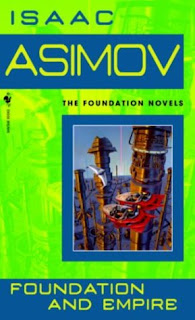
Foundation and Empire by Isaac Asimov was originally the second in a trilogy of novels. First published in 1952, the novel is in fact two stories or two novellas originally published (separately) in 1945.
Things you should know:
*Foundation was good. Really good. But Foundation and Empire was even better.
*Foundation and Empire is infinitely better than Prelude to Foundation.
*While I would certainly recommend reading Foundation, I think you could pick up Foundation and Empire without having read the other and still appreciate it for the great book that it is. It does in fact include a nice two page summary of the novel Foundation.
*Foundation and Empire has a certain something-special about it that makes it stand apart from Foundation. The writing seems wittier, funnier, more tongue-in-cheek. There's just something about it that makes it pop.
I am still operating under the philosophy of sometimes it is better not to know, BUT at the same time I don't want to be accused of not "reviewing" it properly.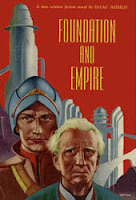 Foundation and Empire roughly picks up about three hundred years after Foundation opens. In the first novella, "The General" the reader learns of the fourth (I believe it's fourth) Seldon crisis. One of the strongest generals of the Empire (what remains of the Empire) is out to destroy the Foundation. Bel Riose is the general's name. Ducem Barr, the son of a man we met briefly in Foundation, is a main character--a character that opposes the Empire even at great risk to his own life and his own family. Lathan Devers, a trader, is also of importance. The plot of "The General" is relatively simple, and this is the shorter of the two stories. In the second novella, "The Mule" the Foundation faces its GREATEST threat so far. It begins simply with the homecoming of a bride and groom. Bayta and Toran. They're visiting Toran's family on the planet of Haven. Haven is a "rat hole" of a planet where traders--mostly retired traders--go to hide out and evade paying taxes to the Foundation. The planet is technically a part of the Foundation. But they're more of a rebellious bunch on Haven. The reader soon learns that not everyone thinks Foundation is perfect when it comes to running the galaxy--or their small part of the galaxy. There is discontent among the ranks of citizens. But even the threat--the small threat--of civil war pales in comparison to the REAL threat of The Mule. I will say no more about the Mule or the rest of the story. I don't care how curious you are! Some things you can't pry out of me.
Foundation and Empire roughly picks up about three hundred years after Foundation opens. In the first novella, "The General" the reader learns of the fourth (I believe it's fourth) Seldon crisis. One of the strongest generals of the Empire (what remains of the Empire) is out to destroy the Foundation. Bel Riose is the general's name. Ducem Barr, the son of a man we met briefly in Foundation, is a main character--a character that opposes the Empire even at great risk to his own life and his own family. Lathan Devers, a trader, is also of importance. The plot of "The General" is relatively simple, and this is the shorter of the two stories. In the second novella, "The Mule" the Foundation faces its GREATEST threat so far. It begins simply with the homecoming of a bride and groom. Bayta and Toran. They're visiting Toran's family on the planet of Haven. Haven is a "rat hole" of a planet where traders--mostly retired traders--go to hide out and evade paying taxes to the Foundation. The planet is technically a part of the Foundation. But they're more of a rebellious bunch on Haven. The reader soon learns that not everyone thinks Foundation is perfect when it comes to running the galaxy--or their small part of the galaxy. There is discontent among the ranks of citizens. But even the threat--the small threat--of civil war pales in comparison to the REAL threat of The Mule. I will say no more about the Mule or the rest of the story. I don't care how curious you are! Some things you can't pry out of me.
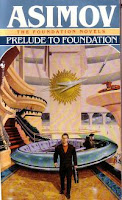
Prelude to Foundation by Isaac Asimov is a prequel to Foundation. (Foundation was originally published in 1951. Prelude to Foundation was published in 1988.) It is VERY different than the original novel. Foundation, if you recall, is composed of five segments. Each one separate, distinct. The story--the plot--is loosely woven together. The main theme could be construed to be one of ambition. Various individuals separated by time and often place are very thirsty and hungry for power. All use manipulative tactics to advance their cause--the cause to be #1 and to boss everyone around. But Prelude to Foundation is set on one planet, and follows primarily the life of one man for a handful of months. (If I had to guess, I'd say more than three but less than twelve.) And Prelude to Foundation does have a very similar theme. It too is all about ambitions, agendas, and propaganda.
You might be thinking, BUT WHAT IS IT ABOUT???? Prelude to Foundation is the story of Hari Seldon. A young man who finds his world turned upside down after giving a speech--reading his research paper--at a mathematical convention. His topic? Psychohistory. Suddenly, Seldon finds himself a hot commodity. Power-hungry people seem determined to use him, to use his supposed theory as a propaganda machine for their own agendas. Seldon is convinced throughout seven-eighths of the novel that the theory of psychohistory is impossible. While it might theoretically be possible to to decipher the ins and outs of the philosophy, the science. It is just that a theory that hasn't been proven. And a theory that is unlikely to be proven since it is so complex, so headache-causing that even the supposed inventor of this theory can't understand or explain what exactly he means by the concept. Seldon doesn't want to deal with this "theory" in the practical. It boggles his mind that others are so determined to make him apply it politically, socially, economically. This one little research paper has him on the run for his life. Okay, life might be an exaggeration. No one is out to kill him--for the most part--they just want to trap him, use him, keep him under their control. (Which one could argue would seriously hinder his "living" life at all.) Of course, this isn't Hari Seldon's story alone. There are many, many characters. Many, many plot twists. Many things that make this novel complex.
If I had to compare the two novels, Foundation and Prelude to Foundation, this is what I would say. Foundation is like eating a wonderful, delicious meal. You leave the table feeling full and satisfied. You enjoyed every bite. It was an experience. Something to be savored. For me, Prelude to Foundation loses some of the magic. It wasn't like eating a wonderful meal. It is like you're held captive while someone describes to you the minute details of what it took to prepare that meal. The preparations. The recipes. The nutritional value of each dish. The reasonings behind exact serving sizes and garnishes. The how-to's of elaborate table settings. It is a thicker, heavier, weightier read. Very detailed. Prone to lessons and lectures in some places. It gets bogged down in the whys. In some ways it is a less satisfying read. Of course, this is all subjective.
Since it is a prelude, it is now listed as "first" in the series. I think this might just be a mistake. Of course, I can't unread Foundation to fairly evaluate Prelude to Foundation. But in all honesty, if I read Prelude to Foundation first, I'm not sure I'd bother to go on with the series. If I did, I certainly wouldn't be in any hurry or rush to do so. Prelude to Foundation was boring in places, while Foundation had me spellbound the whole way through.
Forward the Foundation is another prequel. It also goes "before" the original novel Foundation.
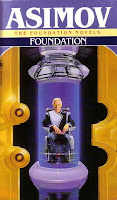
Some books feel like friends from the very beginning. Such is the case with Isaac Asimov's novel, Foundation. This book was originally the first in a series of Foundation novels. (However, Prelude to Foundation has since been published.) The novel is composed of five sections. Four of these sections were originally published separately and appeared as short stories in Astounding Magazine between 1942 and 1944. They were later compiled together into one volume in 1951 alongside a newly written introduction section, and thus Foundation as we know now it was published. (Does any of that matter? Not really. I didn't read the details on the publishing history until after I read it. But as an after note, I was intrigued by it. So I thought I'd share it with you.)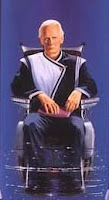 For twelve thousand years the Galactic Empire had ruled supreme. Now it was dying. But only Hari Seldon, creator of the revolutionary science of psychohistory, could see into the future--a dark age of ignorance, barbarism, and warfare that would last thirty thousand years. To preserve knowledge and save mankind, Seldon gathered the best minds in the Empire--both scientists and scholars--and brought them to a bleak planet at the edge of the Galaxy to serve as a beacon of hope for future generations. He called his sanctuary the Foundation.
For twelve thousand years the Galactic Empire had ruled supreme. Now it was dying. But only Hari Seldon, creator of the revolutionary science of psychohistory, could see into the future--a dark age of ignorance, barbarism, and warfare that would last thirty thousand years. To preserve knowledge and save mankind, Seldon gathered the best minds in the Empire--both scientists and scholars--and brought them to a bleak planet at the edge of the Galaxy to serve as a beacon of hope for future generations. He called his sanctuary the Foundation.
But soon the fledgling Foundation found itself at the mercy of corrupt warlords rising in the wake of the receding Empire. Mankind's last best hope was faced with an agonizing choice: Submit to the barbarians and be overrun--or fight them and be destroyed.
What can I say about Foundation without giving too much away? It is one of those rare books where it's best not to know. Best not to have preconceived notions of what it's all about. Best not to think too much about what it's saying and where it's going. It's best to just go along for the ride on this one.
The settings? Various planets. The characters? Too many to list. The plot? Complex but not difficult to follow. Each section of the book is separate from the whole. Most are divided by time. Between sections, thirty years, eighty years, fifty years, a hundred years could have passed. The reader picks up hints here and there about how much time has gone by. But this isn't a book where you follow characters around. This is more of a novel where ideas play the leading role.
If there is a cohesive theme to the novel it is manipulation. Whether passive or aggressive, Foundation is all about power struggles, manipulations, and getting others to do what you want when you want. It is all about ambition.
Do not look at this chart unless you want to confuse yourself. (Or you've read a good many of the books already.) For plot summary of the first novel, click here. For more information on the series as a whole, click here.
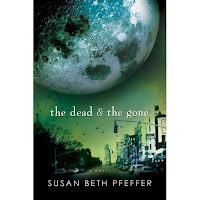
Pfeffer, Susan Beth. 2008. The dead & the gone. (June 2008)
The dead and the gone is the much-anticipated follow up novel to Life As We Knew It. Though the characters and setting are different--New York not Pennsylvania--the terror and uncertainty of future days is the same. Our narrator is Alex Morales, an older teen (perhaps 17?), whose world is about to be turned upside down. While there was set up in Life As We Knew It, the dead and the gone begins with the BIG event. Wednesday, May 18... At the moment when life as he had known it changed forever, Alex Morales was behind the counter at Joey's pizza, slicing a spinach pesto pie into eight roughly equal pieces. (1). Of course, at that moment, Alex doesn't know that. He's just your average teen. His mom was a nurse called into work that evening unexpectedly. His dad was out of the country attending the funeral of Alex's grandmother. His older brother, Carlos, is away from home and in the Marines. Thus when the calamity happens, it is on Alex and Alex alone to protect his family--his two younger sisters--and begin the fight for their ultimate survival.
In Life As We Knew It, no matter how bad it got, Miranda, the narrator, could relax a bit. Her mom was there for her and her brothers. Her mom was there to tell her what to do. There to make a plan. There to support her, comfort her, and yes, at times to annoy her. But Alex, Briana, and Julie. These three siblings have to face the unknown alone. It's not that they're completely alone, the dead and the gone introduces the element of faith and community in the midst of disaster, but without parental guidance, support, and love. Imagine being that age when the world starts to crumble. When the volcanoes and epidemics start. To know that the world will never be the same again. To know that if humanity is to survive this at all, it will be only a few, only the strongest, only the bravest. There is no safe place anymore. There is no reassurance, no promise of a better day, a brighter day. Now imagine being the caregiver of not one but two younger sisters. Sisters who'd fall apart without you. Sisters who are depending on you, trusting in you to provide for them, to protect them. Alex bears a heavy burden. Not only is he fighting for his own survival, he's fighting for the lives of his sisters.
As for his parents, his extended family, his friends and neighbors and classmates, too many are listed as "the gone" their final fates unknown in this captivating companion novel. While Life As We Knew It showed the private battle of one family for survival, the dead and the gone captures the story of a neighborhood, a community. I'm not sure whether to be surprised or not, but one thing that intrigues me is the element of faith and religion in this novel. When so many elements of society are falling apart, are crumbling, the Catholic church is strong and resourceful. They're not abandoning their flocks. They're a place where the faithful can come to rally, to rebuild their strength, regain their focus. They are actually providing for the needs of others. It's not that they're selfless. But they haven't forgotten the message of Christ either. They are living out the compassion of Christ who said...in this world you will have trouble, but I leave you my peace. That's what I see their mission as in some ways, caring for the physical and spiritual needs of the faithful. They can't stop the bad things from happening, they can't "solve" any problems. But they can be there, they can provide solace and peace for those who feel so downtrodden, so troubled.
Those who have read Life As We Knew It, will know that this is an intense novel. That it will leave you cold and hungry and a bit anxious of full moons. The dead and the gone is a companion novel to Life As We Knew It, but it stands alone. You don't need to have read Miranda's story to embrace this one. Alex's story is just as intense, just as strong, just as captivating, just as memorable. However, I would encourage everyone to go ahead and read Life As We Knew It in the months leading up to the release of the dead and the gone. There are so many memorable scenes, memorable passages that whether you read the book or listen to the audio, it is sure to haunt you.
You may read my review of Life As We Knew It here and here.
You may visit the author's blog here.
Other reviews of the novel are here, here, here, here, and here.

Carl from Stainless Steel Droppings is hosting an experience this January and February. He clearly points out that it is not a challenge per se, more of an experience. There are no required number of books. The goal is to have fun and to read books. For those that are intimidated perhaps by reading challenges and feeling that there is a "have" or "must" about them--it's a good distinction. I read his description--although Carl might disagree--and think of it as taking a class without receiving a grade. For the record, I'm still planning on counting this one as a "challenge" in my reckoning. Because I belong to a group that keeps track of how many challenges per year you participate in and complete. It's all fun. I don't take the numbers too seriously, after all, but I like the challenge of being challenged. Read all about the sci-fi experience here. Read the sci-fi experience reviews here.
I plan on reading some Orson Scott Card. An obvious choice for me since not only do I love him, but the Cardathon challenge officially begins January 1rst. I may (may being the key word) read C.S. Lewis' sci-fi trilogy. I'd like to perhaps read some Asimov as well. But I may be too busy to squeeze that in. If you have suggestions, ideas for books--titles and/or authors--please suggest away. My familiarity with the genre really goes no further than OSC and a few H.G. Wells and Ray Bradbury's Martian Chronicles.
The experience goes from January 1 to February 29th.
Becky,
I haven't read your review yet because I'm eagerly awaiting my copy of the ARC. I'm hoping it came to the school while I was on Christmas break. We go back today so I'll know soon enough. I CANNOT wait to read it. I'll read your review as soon as I finish the ARC.
Happy New Year!
Paige
I haven't read Life As We Knew It, and was a little nervous about reading the galley of The Dead and the Gone. But you're right. No need to have read the first book.
Great review, Becky.
Sounds like a lovely and beautiful series!
This sounds like a great book. I love books of that genre, I will have to add it to my list.
Wow-I'm not usually a fan of dystopian novels-but your review makes this one sound so good! I'm especially intrigued by the Catholicism in it (as a non-practicing Catholic, lol). Have you read The Sparrow? That was an interesting sci-fi take on the issue of exploring, and what happens when 'colonizers' enter a new world. It also had Catholicism, mainly the Jesuits in it, which is the only reason this review made me think of it. :)
Sounds interesting. Oddly coincidental that my first read for the new year, Speaker for the Dead, also has quite a bit of Catholicism in it and I feel like Card handled it very respectfully and actually used religion to 'matter' in the book without being preachy. Its nice to hear that this book does the same.